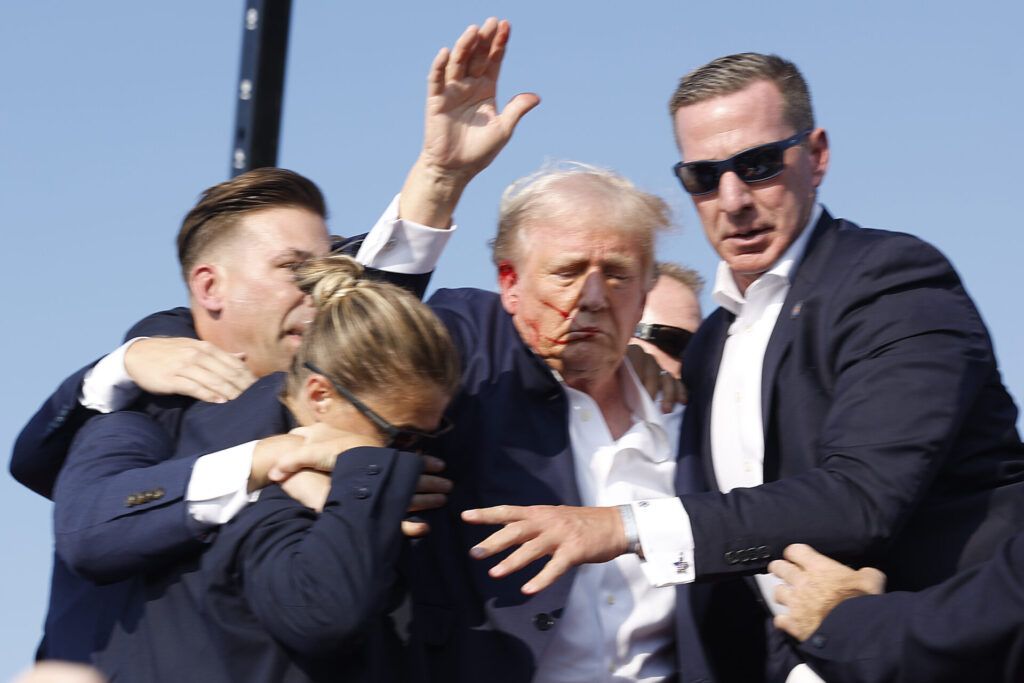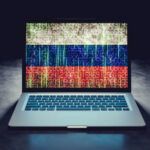An attempted assassination and the conspiratorial disinformation that followed
By John Mecklin | July 14, 2024
 Republican presidential candidate former President Donald Trump is rushed offstage during a rally on July 13 in Butler, Penn. (Photo by Anna Moneymaker/Getty Images)
Republican presidential candidate former President Donald Trump is rushed offstage during a rally on July 13 in Butler, Penn. (Photo by Anna Moneymaker/Getty Images)
The attempted assassination of former President Donald Trump will at least temporarily soften the political campaigns of both Trump and the Democratic presidential nominee, whether that be (as seems most likely) President Joe Biden or someone else. And actually, it already has done so, with the Biden campaign reportedly taking down anti-Trump campaign advertising and Trump campaign managers telling staff not to comment publicly or engage in “dangerous rhetoric on social media.” In his initial remarks after the assassination attempt, Biden said the shooting was “sick” and called on the country to unite. Even Trump’s wife Melania, who has largely remained in the background during the 2024 campaign, joined in the calls from both camps to tone down political rhetoric.
— MELANIA TRUMP (@MELANIATRUMP) July 14, 2024
All the same, as with previous attacks on US presidents, conspiracy theories quickly blossomed, and they were anything but genteel. The information environment of 2024 is radically different than what existed during earlier US assassinations and assassination attempts. The shooting of Trump was quickly followed by an enormous barrage of speculation and outright invention across social media platforms, from smaller outlets firmly planted in the far-right side of the US political spectrum—including Gab, Parler, and Trump’s own Truth Social—to Elon Musk’s X (nee Twitter) and other larger sites.
The assassination attempt was still under investigation on Sunday, and many basic facts—including the would-be assassin’s motives—remained unknown or had at least not been made public. The shooter was identified as Thomas Matthew Crooks, a 20-year-old resident of Bethel Park, a Pittsburgh suburb located about an hour from the site of the Butler, Pennsylvania political rally where Trump was shot. A Secret Service sharpshooter reportedly killed Crooks shortly after he used an assault rifle to fire multiple shots from a rooftop outside the site of the rally; one of the shots struck Trump’s ear. Beyond the ear wound, the ex-president was apparently uninjured. A firefighter attending the rally was killed and two other attendees wounded in the fusillade.
FBI officials said Sunday that they had no reason to believe that Crooks was acting as part of a wider plot. Attempts to background the young man—who worked as a nursing home aide—had produced only fragmentary public information by mid-Sunday. Those who’d known him in high school in Bethel Park described him alternately as either merely quiet or a bullied loner; public records showed that when he was 17 years old, he’d made a $15 donation to a Democratic political group, but that he had since registered as a Republican. His father was a registered Libertarian and his mother a registered Democrat, CNN reported.
This limited public profile provided essentially no clues as to Crooks’s politics or motives for attempting to kill Trump. “If he turns out to have anything in his background that could possibly be tied to anti-Trump or pro-Biden, that’s going to be amplified far out of proportion,” said Herb Lin, an internet disinformation expert based at Stanford University.
The lack of information about Crooks didn’t deter some Trump supporters from immediately portraying the shooting as a result of Democratic rhetoric characterizing the former president as a threat to democracy. J.D. Vance, a Republican US senator from Ohio who is in the running to be Trump’s pick as vice president, was not subtle in his evidence-free accusation.
Today is not just some isolated incident.
The central premise of the Biden campaign is that President Donald Trump is an authoritarian fascist who must be stopped at all costs.
That rhetoric led directly to President Trump’s attempted assassination.
— J.D. Vance (@JDVance1) July 14, 2024
Republican congressman Mike Collins of Georgia was equally direct in blaming Biden for the shooting—and equally lacking in evidence for the claim.
They attempted to neutralize the threat. pic.twitter.com/aOHrVTrk0t
— Rep. Mike Collins (@RepMikeCollins) July 14, 2024
Other right-leaning commenters suggested, without evidence, that the shooting was a “deep state” plot.
In the immediate wake of the televised shooting, some on the left contended, almost certainly falsely, that the shooting may have been staged to make Trump into a hero. The Washington Post reported that the word “staged” trended on X/Twitter after the shooting.
And from all parts of the political spectrum, observers marveled at the shocking security breakdown that allowed a man carrying an assault rifle to scale a roof some 150 yards from a potential president of the United States and shoot at him.
1/ How did the Secret Service and other law-enforcement miss the rooftop sniper who shot Donald Trump, injuring him slightly, and killing a bystander?
That’s the No. 1 question for the after-action investigation.
— David Cay Johnston (@DavidCayJ) July 14, 2024
New York University journalism professor and media critic Jay Rosen offered this pithy description of the unfortunate media environment surrounding the attempted assassination on Sunday:
First 24 hours are ideal conditions for bad media:
* Interest in the facts is off the charts, but there is only a handful of them
* Bad actors fill the unmet demand
* Political discussion silenced by civiltarians
* Both sides bromides roar
* Memory itself said to be in bad taste— Jay Rosen (@jayrosen_nyu) July 14, 2024
(Rosen also praised this piece on the aftermath of the shooting by Financial Times US national editor and columnist Ed Luce. I also recommend it.)
In response to questions about the distortion of the information ecosphere that the Trump shooting had already inspired, Princeton University professor and disinformation expert Jacob N. Shapiro offered three main observations. First, he noted, “it’s no surprise that conspiracy theories about the shooting are spreading fast. They are a way for influencers to get attention and for people to express their shock and disbelief at this tragic event.”
But, Shapiro said, those kinds of conspiratorial ideas would spread largely within communities already interested in the content, “enabled by algorithms that help people find content similar to things they have engaged with in the past.” Fortunately, he added, most relevant studies “show the algorithms do little to spread that content into other communities.”
And, Shapiro said, although it is hard to limit the spread of conspiratorial ideas within a population predisposed to take them seriously, people outside those circles are more open to evidence. For them, he said, news reporting that debunks disinformation is the best tool available. “There is strong evidence that informing people about the facts ahead of time reduces the impact of false stories on beliefs and on interest in sharing them,” Shapiro said.
It seemed clear as Sunday progressed that Republicans and Democrats would engage in coming weeks in a battle of competing narratives. Republicans seem likely to continue to blame the shooting of Trump on Democratic rhetoric about the former president’s anti-democratic, authoritarian, and law-breaking proclivities, in effect trying to turn those largely fact-based contentions against themselves. And the day after the attempted assassination, some anti-Trump advocates were highlighting the numerous instances in which the former president had promoted political violence or ridiculed Democrats who had been its victims (as when he joked publicly about a hammer-wielding attacker who fractured the skull of Paul Pelosi, the husband of former House Speaker Nancy Pelosi).
If there was any real likelihood the country would reunite in the aftermath of the attempted assassination of Donald Trump, New York Times veteran presidential observer Peter Baker found it hard to discern. His analysis of the situation on Sunday was headlined “An Assassination Attempt That Seems Likely to Tear America Further Apart.”
Together, we make the world safer.
The Bulletin elevates expert voices above the noise. But as an independent nonprofit organization, our operations depend on the support of readers like you. Help us continue to deliver quality journalism that holds leaders accountable. Your support of our work at any level is important. In return, we promise our coverage will be understandable, influential, vigilant, solution-oriented, and fair-minded. Together we can make a difference.















Wow how quickly we forget that Trump spent months telling lies about election fraud and then incited a mob to attack congress to stop the constitutional hand off of power…. and speaking the accurate truth that Trump is a threat to democracy is somehow the cause of his being shot at…….
“…almost certainly falsely…” these are the actual facts: – The rally was held in a highly pro-Trump county – The shooter was an easily impressionable 20 year old REGISTERED REPUBLICAN – There was MULTIPLE eyewitnesses to the shooter setting up on the top of the building NEAREST the rally. One officer even stood down when approaching the shooter. – Trump is KNOWN to only surround himself with “yes men” so why would you assume his Secret Service detail is any different? – EVERY security agency is questioning why the Secret Service wouldn’t secure that roof. – After the SS jumped… Read more »
Why is the Bulletin of Atomic Scientists weighing in on this matter? Stick to the physics.
The Bulletin of Atomic Scientists will weigh in on any event pertaining to global security. An assassination attempt on a former president running for re-election in the U.S., especially one as controversial as Trump, in our nationally and globally volatile times certainly qualifies in this regard. There are many other publications that will “…stick to the Physics”.